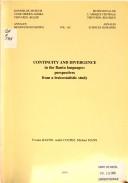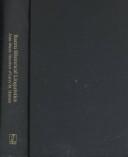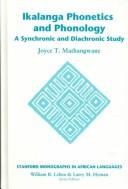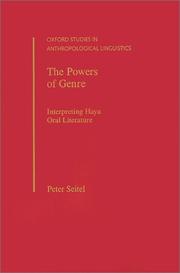| Listing 1 - 7 of 7 |
Sort by
|
Book
Abstract | Keywords | Export | Availability | Bookmark
 Loading...
Loading...Choose an application
- Reference Manager
- EndNote
- RefWorks (Direct export to RefWorks)
Bantu languages --- Tone. --- Tone --- Tone (Phonetics)
Book
ISBN: 9173463647 9789173463645 Year: 1999 Volume: 13 Publisher: Göteborg Acta universitatis Gothoburgensis
Abstract | Keywords | Export | Availability | Bookmark
 Loading...
Loading...Choose an application
- Reference Manager
- EndNote
- RefWorks (Direct export to RefWorks)
Bantu languages
---
Noun.
---
Grammar, Comparative.
---
-Bantu languages
---
-#BIBC:ruil

ISBN: 9075894279 9789075894271 Year: 1999 Volume: 162 Publisher: Tervuren Koninklijk Museum voor Midden-Afrika
Abstract | Keywords | Export | Availability | Bookmark
 Loading...
Loading...Choose an application
- Reference Manager
- EndNote
- RefWorks (Direct export to RefWorks)
Bantu language --- Afrikaanse talen --- Bantoetaal --- Bantou (langues) --- Langues africaines --- Bantu languages --- Langues bantoues --- Lexicology --- Statistics --- Lexicologie --- Statistiques --- Lexicology. --- Kintu languages --- Ntu languages --- Sintu languages --- Benue-Congo languages --- Bantu languages - Lexicology --- Bantu languages - Statistics

ISBN: 1575862042 Year: 1999 Publisher: Stanford CSLI
Abstract | Keywords | Export | Availability | Bookmark
 Loading...
Loading...Choose an application
- Reference Manager
- EndNote
- RefWorks (Direct export to RefWorks)
Bantu languages --- Classification. --- Morphology. --- Phonology. --- Kintu languages --- Ntu languages --- Sintu languages --- Benue-Congo languages --- Classification --- Morphology --- Phonology
Book
ISBN: 3895866490 Year: 1999 Publisher: München LINCOM Europa
Abstract | Keywords | Export | Availability | Bookmark
 Loading...
Loading...Choose an application
- Reference Manager
- EndNote
- RefWorks (Direct export to RefWorks)
Grammar --- Bantu language --- Kwango --- Yaka language (Congo and Angola) --- Tone (Phonetics) --- Iaka language --- Kiyaka language --- Yaka language (Zaire and Angola) --- Bantu languages --- Morphology --- Tone

ISBN: 1575861631 Year: 1999 Publisher: Stanford (Calif.) : CSLI,
Abstract | Keywords | Export | Availability | Bookmark
 Loading...
Loading...Choose an application
- Reference Manager
- EndNote
- RefWorks (Direct export to RefWorks)
Kalanga language (Botswana and Zimbabwe) --- Bakaa language --- Chikalanga language --- Ikalanga language --- Kalaga language --- Kalana language --- Makalaka language --- Makalanga language --- Sekalana language --- Sekanana language --- Shona language, Western --- Wakalanga language --- Western Shona language --- Bantu languages --- Phonetics. --- Phonology. --- Theses --- Phonetics --- Phonology

ISBN: 1280761520 0198027702 9780198027706 019511700X 9780195117004 0197722237 Year: 1999 Publisher: New York : Oxford University Press,
Abstract | Keywords | Export | Availability | Bookmark
 Loading...
Loading...Choose an application
- Reference Manager
- EndNote
- RefWorks (Direct export to RefWorks)
The Powers of Genre describes a method for interpreting oral literature that depends upon and facilitates dialogue between insiders and outsiders to a tradition. Seitel illustrates this method with lively examples from Haya proverbs, folktales, and heroic verse. He then focuses on a single epic ballad to demonstrate, among other things, why stanzas need not rhyme, and how significance needs time in oral poetry and narrative. Making a controversial claim that an heroic age, similar to that of Ancient Greece, existed in Sub-Saharan Africa, this work will intrigue anyone who works in oral literature.
Discourse analysis, Narrative --- Folk literature, Haya --- Haya (African people) --- Haya language --- Oral tradition --- Tradition, Oral --- Oral communication --- Folklore --- Oral history --- Aiba language --- Ekihaya language --- Heia language --- Kiziba language --- Luhaya language --- Lusiba language --- Ruhaya language --- Ziba language --- Bantu languages --- Aiba (African people) --- Babumbiro (African people) --- Bahamba (African people) --- Bahaya (African people) --- Bahyoza (African people) --- Banyambo (African people) --- Basiba (African people) --- Baziba (African people) --- Buhaya (African people) --- Ekihaya (African people) --- Haya (African tribe) --- Heia (African people) --- Kiziba (African people) --- Ruhaya (African people) --- Wahaya (African people) --- Wassiba (African people) --- Ziba (African people) --- Bantu-speaking peoples --- Ethnology --- Haya folk literature --- Haya literature --- Narrative discourse analysis --- Narration (Rhetoric) --- History and criticism. --- Haya language. --- Folklore.
| Listing 1 - 7 of 7 |
Sort by
|

 Search
Search Feedback
Feedback About UniCat
About UniCat  Help
Help News
News